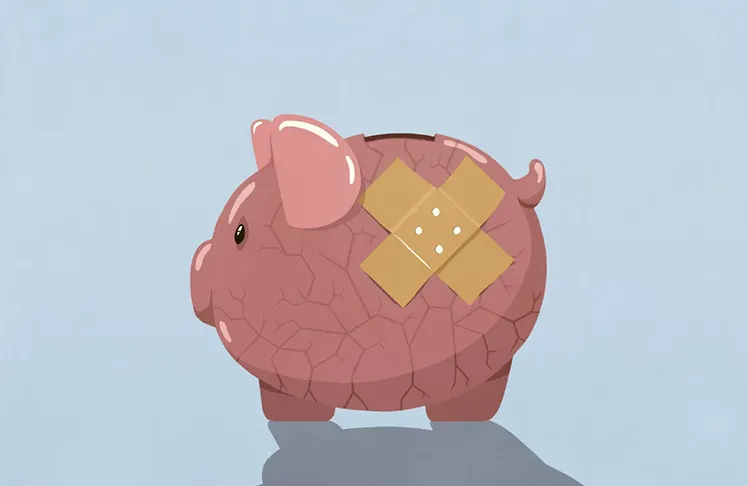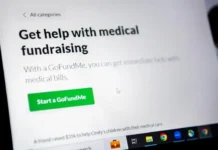
Daric L. Cottingham has to make a choice: pay her rent or continue gender-affirming care. Soon, she’ll run out of hormone replacement therapy.
Laid off seven months ago, the 28-year-old Black trans woman has seen her gender transition hit a roadblock as medical bills pile up. With no job and limited insurance coverage, she’s turned to crowdfunding platforms like GoFundMe to cover the costs of gender-affirming care.
“I knew that I would rather ask for help,” the Los Angeles-based media professional says. “But that bootstrap mentality in our country makes the whole process of asking for help feel embarrassing, a bit dehumanizing and degrading — I had to put my pride and ego aside. I can’t continue to pursue my gender affirming care if I’m not around.”
Cottingham is not alone. Roughly one-third of all GoFundMe campaigns are dedicated to covering medical costs, a stark reflection of the U.S.’s broken healthcare system. But it begs the question: Is this system broken, or is it working exactly as intended?
Crowdfunding for Survival

Gender-affirming health care coverage varies by state, with some insurance plans using exclusionary language like “sex reassignment surgery” to deny coverage to a trans person. And for Cottingham, certain cosmetic surgeries or procedures weren’t covered by her previous health insurance plan.
Like many others caught between medical needs and financial realities, along with GoFundMe, Cottingham also uses PayPal, CashApp, Venmo, Kickstarter, and Zelle to raise funds that pay for food, housing, and medical expenses.
But the process is far from simple.
Crowdfunding platforms take a cut, with platform processing fees ranging from roughly 3% to 7%, and platforms like GoFundMe and GoGetFunding take an additional $0.30 cents per donation. As a result, individuals like Cottingham need to calculate how much will be deducted from their donations plus how much money they need to receive.
“It’s a catch-22 kind of thing. The fees are terrible,” Cottingham says. “But you have to use these crowdfunding platforms because they add credibility to what you’re crowdfunding for.”
Is it Really a Broken System?
The popularity of crowdfunding platforms to help with medical bills speaks to a larger problem about the American health care system. “Medical debt, in some sense, is a symptom of a broken system,” Neale Mahoney, professor of economics at Stanford University, says. “The price of health care is very high in the U.S.”
Overall, about 8% of adults in the U.S. have medical debt. But Black Americans are more likely to have medical debt — at nearly twice the rate of white Americans.
The main reason people get medical debt, Mahoney explains, is when an individual loses or does not have access to health insurance coverage, and they have a health care shock. And, depending on the state, medical debt from a patient can be sold to debt collectors for pennies on the dollar.
In a recent study Mahoney co-authored, researchers found no effect of medical debt relief on someone’s mental health. Which means the stress, anxiety, and depression that is often associated with medical debt isn’t alleviated when a debt is forgiven.
“What was disappointing about the study is that when you wait so long to provide people relief, it doesn’t make a big difference,” he says. “People have already become scarred because of the debt collection process. So, addressing the problem at that point is too little, too late. And that’s discouraging.”
Although insurance can be challenging to obtain, as it’s often dependent on employment, Mahoney says it has been shown to significantly improve access to preventative care, reduce financial distress, and improve health care outcomes. But even still, where does that leave folks with insurance and medical debt — or without insurance and scraping by to pay medical bills?
“I think there’s no easy fix,” he says.
Mahoney says ultimately, health care services need to be cheaper, there needs to be an expansion of health insurance, and hospitals need to provide the financial assistance they’re required to by law. Otherwise, patients who experience a health crisis, have a chronic illness, or need regular health care services will constantly be left to use crowdfunding platforms to pay for medical expenses.
“It does speak to the strength of our communities and the compassion we feel for people who are suffering with medical debt. Nobody chooses to get medical debt,” Mahoney says. “On the other hand, I think it speaks to this huge failure of our health care system. It’s the role of government to pick people up when they’re down. We’re letting way too many people fall through the cracks when it comes to the cost of health care. And I see this as emblematic of our broken health care system.”
Our reporting continues to show how the health care system has perpetuated disparities and discrimination. However, others question whether it was meant to do anything else.
“Everyone would say that the system is broken, I would say that the system is working exactly as it was intended to,” Cottingham says. “The health care system is known to prey on people’s time of need to pad companies’ pockets. Unfortunately, medical care is not about the well-being of the patient.”
The Vulnerabilities of Crowdfunding
It doesn’t take long to scroll through GoFundMe to find a campaign to help with medical expenses from a cancer diagnosis. But regardless of the type of medical fundraiser, Monica Bryant, the chief operating officer and co-founder of Triage Cancer, a national nonprofit organization that provides free education on legal and practical issues that can arise after a cancer diagnosis, says there’s a downside not spoken about enough.
“One of the challenges is around disclosure and privacy. Crowdfunding campaigns are typically public, that means a person’s medical information is out there for the world to see,” Bryant says. “That can become challenging for people in the future.”
Bryant says public crowdfunding can make it difficult to get a job because a potential employer has access to public medical information. The Americans with Disabilities Act provides legal protections with respect to discrimination, she says, but it can be difficult to prove discrimination from a potential employer viewing public medical information.
It’s not just about employment. Bryant says people don’t always think about the ramifications of receiving donated funds. For example, if an individual is receiving Medicaid, SNAP benefits, housing assistance, or federal student aid, getting an influx of money from a crowdfunding campaign can jeopardize those benefits.
“Depending on the state they were in, they might lose that Medicaid,” she says.
And in a social context, when it comes to dating, someone may already have someone’s medical information prior to meeting. While Bryant emphasizes that it’s a personal decision to disclose, she tells all her clients to think ahead before sharing private information.
“It’s not so much that there are overt dangers with sharing,” she says. “It’s about making sure people understand they have rights and decisions to make around disclosure.”
Transparency Is a Double-Edge Sword
Research shows that most crowdfunding donors give donations to people in need — usually someone experiencing a hardship or financial challenge. But recent data highlights the growing disparity in the crowdfunding space.
In 2023, researchers found that white men are significantly overrepresented in highly successful medical crowdfunding campaigns. Overall, Black people, and Black women are significantly underrepresented. Black women’s campaigns represented only 0.6% of successful medical campaigns.
Cottingham, an award-winning journalist, was already established in her career when she publicly came out as transgender. With a fluctuating job market, she’s had a difficult time trying to land her next full-time gig. And some have suggested she use social media platforms to document her transition to pay bills.
“I don’t think marginalized people should have to fall on a sword to survive or bear our souls to the world to finally be seen as human and deserving of things,” she says. “So that part of crowdfunding, for me, it’s really hard.”
Part of the challenge to get donations for Cottingham’s gender affirming care, is the relatability of the experience. Oftentimes, she says, people will donate to causes that they can empathize with or are familiar with. For example, requesting money for rent after losing a job is a relatable experience. However, with only about 1% of the adult population identifying as transgender, it can be seen as more of a niche experience.
Since being so vocal and public about her transition, Cottingham says she often gets words of support online. But these acknowledgments don’t often translate into financial support. “I’ve noticed that in my crowdfunding, people wish me well, but their own beliefs are anti-trans, and they support from the sidelines.”
With racial bias and transgender bias against her, Cottingham can’t help but feel pressured to explain why she needs the money. She tries to be as transparent as possible but is concerned about how much information she discloses about her body. “I hate that I have to let people know what I would like to do to my body,” she says. “It’s a very vulnerable thing to do.”
As a result, Cottingham continues to job hunt and crowdfund simultaneously. Doing both is time consuming, as she continues to be in survival mode. And she is candid about the toll it has taken on her mental health.
“Not a lot of people believe in trans rights and that we deserve the medical care that we require,” she says. “My mental health is in shambles. I constantly feel dehumanized.”















